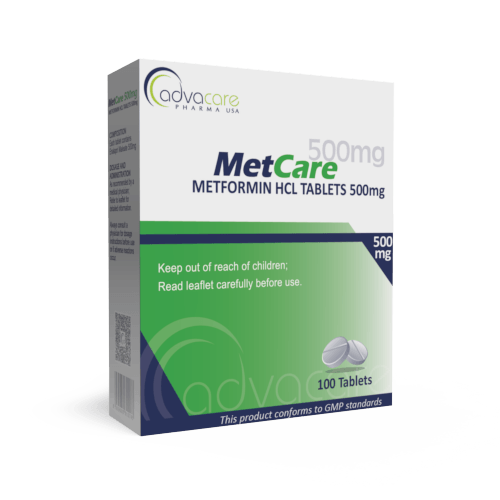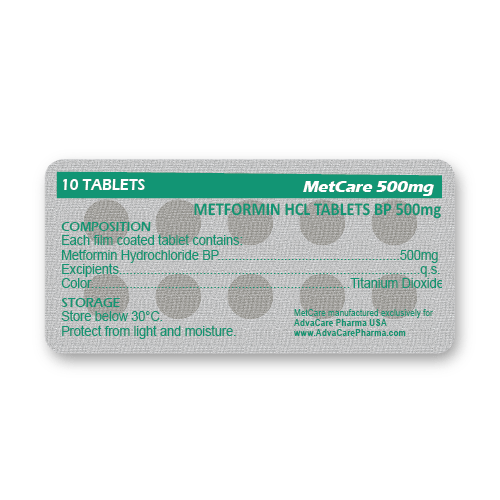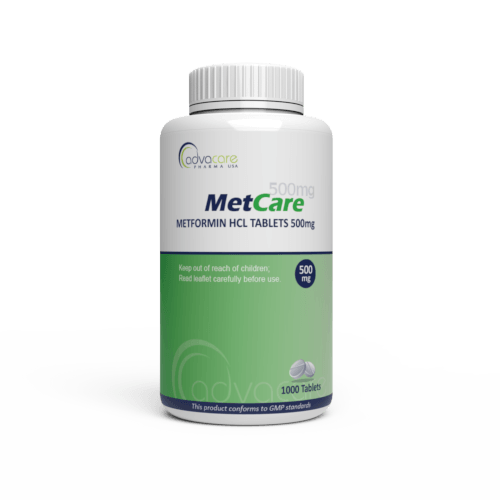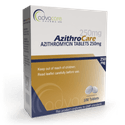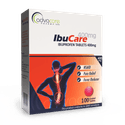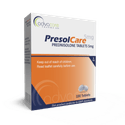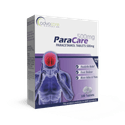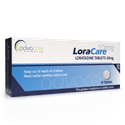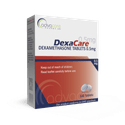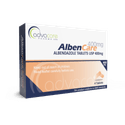- Home›
- Pharmaceuticals›
- Pharmaceutical Tablets›
- Metformin HCl Tablets
Metformin HCl Tablets
Dosage
Packaging
What is Metformin HCl?
Active Ingredients: Metformin HCl
Metformin HCl Tablets are a drug used as a first-line therapy in the treatment of diabetes mellitus (type 2 diabetes). It is used in combination with a diet and exercise program. This drug may be used as monotherapy or with other antidiabetic medications. It is not used to treat type 1 diabetes.
Metformin hydrochloride is a member of the biguanide class of antihyperglycemics. It works by decreasing glucose absorption from food, reducing the amount of glucose made in the liver, and increasing the body's response to insulin. This drug works by lowering both basal and postprandial plasma glucose. It decreases hepatic glucose production and intestinal glucose absorption which all improves insulin sensitivity. This medication does not cause hypoglycemia and hyperinsulinemia.
The bioavailability of a 500mg tablet in fasting conditions is around 50-60%, while food delays the absorption. When distributed, this drug is 90% protein-bound and it partitions into erythrocytes. After oral intake, around 90% of the drug is eliminated via the renal route within the first 24 hours, and the plasma elimination half-life is approximately 6.2 hours.
AdvaCare Pharma's Metformin HCl Tablets are manufactured in GMP-certified facilities located in China, India, and the USA. We routinely inspect our production facilities to ensure our products meet health, safety, and environmental standards.
Why are we a top Metformin manufacturer?
AdvaCare Pharma is a manufacturer of Metformin Tablets and other cost-effective and sustainable pharmaceuticals for an ever-changing global market. Metformin Tablets are a GMP-compliant medicine that is available for distribution.
As a leading Metformin manufacturer, we work with international partners including pharmaceutical distributors, hospitals, pharmacies and other medical and government organizations. We have established a vested supplier-distributor relationship, ensuring a mutually advantageous outcome during market entry and development.
Uses
What is Metformin HCl used for?
It is used to treat high blood sugar in people with type 2 diabetes.
How are Metformin HCl Tablets used?
This medication is intended to be taken orally.
What dose should be taken?
The usual dose for adults is 500mg, taken twice per day or 850mg once a day.
There are no defined dosage recommendations for pediatric and geriatric patients.
The dosage is based on medical condition, response to treatment, age, and weight. Refer to a doctor or pharmacist for guidelines on dosage. Do not exceed what they advise.
Who can take Metformin HCl?
Metformin HCl can be used by patients for managing type 2 diabetes. Special consideration should be made when giving this drug to certain patient categories.
Pregnant Abnormal blood glucose levels during pregnancy are due to a higher incidence of congenital abnormalities. Healthcare providers advise using insulin during pregnancy to maintain normal blood glucose levels. Metformin HCl should be used during pregnancy only when clearly needed. There are no adequate and well-controlled studies in pregnant women that approve the usage of Metformin HCl. Consult with a healthcare provider if you are pregnant or planning to get pregnant before using this medication.
Nursing This medicament is excreted into milk as confirmed by animal studies and it reaches levels comparable to those in plasma. Hypoglycemia in nursing infants occurs and doctors should make a good conclusion on whether to continue or discontinue this drug during nursing. Consult with a doctor if you are a good candidate to use this drug during breastfeeding.
Pediatric It can be safely used in pediatric patients aged from 10 to 16 years and no studies have been performed in patients below the age of 10 years. The usage of this drug in patients from 10 to 16 years shows that it is safe and efficacious and shows similar effects as that seen in adults.
Geriatric Metformin HCl in older adults shows a similar response as that in adults. There are no significant differences in responses between the elderly and younger patients. This drug is excreted through the kidney and special consideration should be made when giving it to patients with impaired renal function. The dose should be also based on the renal function.
What should be done in cases of Metformin HCl overdose?
Overdosing usually occurs when taking Metformin HCl in amounts greater than 50g. Hypoglycemia occurs in around 10% of cases of overdosing but no causal association exists. This hypoglycemia is a side effect and it is severe in cases of overdose of this medication. Lactic acidosis occurs in around 32% of metformin overdose cases. Hemodialysis is the best approach to remove the accumulated drug from patients where metformin overdose is suspected.
Is only Metformin HCl enough to treat patients with type 2 diabetes?
It depends on the severity of the cause. Very often, it is the first-line medication for treating type 2 diabetes. It can reduce the amount of glucose produced by the liver and improve the body’s response to insulin.
The treatment plan depends on the severity of the disease and the individual response. Patients are also advised to consume a healthy and well-balanced diet and maintain a regular exercise program to manage this condition.
Other warnings
Lactic acidosis is a rare side effect that might occur after Metformin HCl treatment. It leads to fatal consequences in around 50% of cases. Patients with lactic acidosis due to metformin accumulation are characterized by elevated blood lactate levels (>5mmol/L), decreased blood pH, electrolyte disturbances, and increased lactate/pyruvate ratio.
Treated patients should be monitored for their renal function because Metformin HCl is excreted through the kidneys. Patients with elevated serum creatinine levels should not receive Metformin HCl tablets.
Concomitantly used medications with this product may affect the renal function or the Metformin HCl disposition. Patients should inform their doctors about any drugs they are taking at the moment.
If the patient undergoes a surgical procedure, this drug should be discontinued.
Alcohol should not be consumed while being on Metformin HCl treatment.
Metformin HCl should be avoided in patients with impaired hepatic function because lactic acidosis is associated with impaired hepatic function. This is a rare side effect, but the drug should be given with caution.
Hypoglycemia might occur when caloric intake is deficient or when the patients perform intense physical activities.
Side Effects
As with all pharmaceuticals, some unwanted effects can occur from the use of Metformin HCl Tablets.
Common side effects include, but may not be limited to:
- nausea
- vomiting
- upset stomach
- weakness
- diarrhea
Seek medical attention if the following develop:
- chest pain
- rash
For a comprehensive understanding of all potential side effects, consult a medical professional.
If any symptoms persist or worsen, or you notice any other symptoms, please call your doctor immediately.
Precautions
Do NOT use Metformin HCl Tablets:
- You are allergic to metformin hydrochloride or any of the ingredients.
- You have kidney or liver disease.
- You have heart disease or congestive heart failure.
- You use insulin or other oral antidiabetic medications.
- You have type I diabetes mellitus.
- You have diabetic ketoacidosis.
Before treatment, consult your doctor regarding any medications you are taking to address potential drug interactions.
This medication may not be suitable for people with certain conditions, so it is important to consult with a doctor if you have any health conditions.
Metformin HCl Tablets are not suitable for children under 10 years of age. Patients over the age of 80 should not take this drug unless measurement of creatinine clearance shows that the renal function is not reduced.
Patients with impaired renal function have a decreased renal clearance of the drug.
This product should be kept out of reach of children and pets.
References
Efficacy, Tolerability, and Safety of a Novel Once-Daily Extended-Release Metformin in Patients With Type 2 Diabetes
The objective of this study was to determine the efficacy and safety of a novel extended-release metformin in patients with type 2 diabetes.
It included adults with type 2 diabetes (newly diagnosed, treated with diet and exercise only, or previously treated with oral diabetic medications). The patients were randomly assigned to receive one of three extended-release metformin treatment regimens (1,500mg/day q.d., 1,500mg/day twice daily, or 2,000mg/day q.d.) or immediate-release metformin (1,500mg/day twice daily) in a double-blind 24-week trial.
The results showed decreases (P < 0.001) in mean HbA1c (A1C) levels by week 12 in all patients. The mean reductions in A1C levels from baseline to endpoint were comparable between the two groups receiving 1,500mg extended-release metformin (−0.73% and −0.74%), and not significantly different from the group receiving immediate-release metformin (−0.70%). The group receiving 2,000mg extended-release metformin showed a greater decrease in A1C levels (−1.06%; mean difference [2,000 mg extended-release metformin vs immediate-release metformin]: −0.36 [98.4% CI −0.65 to −0.06]). Decreases in fasting plasma glucose levels were observed as early as week 1 and persisted through week 8, continuing for the duration of the study. The incidence of adverse events was similar across all treatment groups, but fewer patients in the extended-release metformin groups discontinued treatment due to nausea during the initial dosing period compared to those in the immediate-release metformin group.
The conclusion of this study is that once-or twice-daily extended-release metformin is as safe and effective as twice-daily immediate-release metformin. This treatment provides continued glycemic control for up to 24 weeks of treatment.

You might be interested in...
Why AdvaCare Pharma?
As an industry leader, we are aware of our responsibility to provide affordable and sustainable solutions to improve healthcare worldwide.
